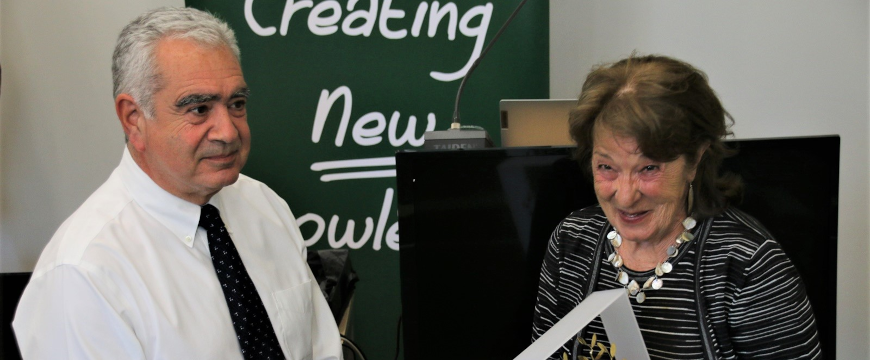The Greek olive sector has been combining tradition with innovation for years. Education on the latest developments has increased alongside investments in cutting-edge technology. This progress was clear at the 2nd International Olive Center Conference on the “Olive Sector: Pursuing Innovation, Exploring Trends” at Perrotis College in Thessaloniki, Greece.
The two-day online conference touched on techniques, procedures, machinery, marketing, and knowledge about olives and olive oil. Talks covered everything from scientific analyses of products to drones flying over olive groves, from consumer education to transformations of olive mill wastewater. Presentations from the USA, Spain, Italy, Israel, Australia, and Greece included both specialized scientific data from research studies and nontechnical presentations relevant to olive farmers, marketers, cooks, and consumers.
Spilios Livanos, the Greek Minister of Rural Development and Food, greeted participants on the first day of the conference, which was devoted to discussions in Greek. Elizabeth K. Lee, US Consul General in Thessaloniki, and Klimentini Diakomanoli, Representative of the European Commission in Greece, welcomed attendees to the second day of the conference, which took place in English. Key figures in research, education, publishing, evaluation, and olive and olive oil organizations discussed their research findings, their work, and their concerns. Health benefits and sustainability were recurring topics.
For example, keynote speaker Professor Doug Mashek of the University of Minnesota, USA, pointed out that “the Mediterranean diet is the gold standard for preventing diseases and maintaining health throughout life,” with the olive oil in it “probably the most enriched source of monounsaturated fatty acids in a diet,” so that it makes an important contribution to the diet’s health benefits.
Olive oil’s health benefits were also addressed by Professor Magda Tsolaki of the Aristotle University of Thessaloniki, who discussed the increasing problem of dementia as the world population ages, the lack of a cure for it, and the ability of extra virgin olive oil (EVOO) to help prevent neurodegeneration. In addition to being antioxidant and anti-inflammatory, EVOO has neuroprotective and anticoagulatory properties which make it very good for our brains. Based on the results of her clinical studies, Tsolaki recommends 50 ml of EVOO daily for those who wish to avoid Alzheimer’s.
Given the European Union’s strict regulations about making health claims for foods, which so far allow no such claims for table olives, Professor Maria Kapsokefalou of the Agricultural University of Athens suggested other ways of promoting the benefits of olives. For example, we could emphasize their nutritional benefits (such as fiber) and their importance as part of the sustainable, traditional, healthy Mediterranean diet.
Kapsokefalou presented the Double Pyramid Model to help explain this. There we see a Mediterranean diet pyramid, with fruit, vegetables, grains, and non-tropical oils at or near the bottom since they are good for our health, and red and processed meat at or near the top, because they should be consumed only occasionally. Next to that pyramid is an inverted pyramid titled “My Climate Impact,” which shows that the foods we should consume a lot for good health–such as fruit and vegetables, olives and olive oil--have less negative impact on the planet, while the foods that are bad for humans are also worse for the earth.
Table olive marketers may want to view Kapsokefalou’s recorded presentation, as well as that of the American expert Alexandra Devarenne, for more marketing hints. There is a wealth of information in the taped presentations, which can be viewed by registering for the (free) conference. Olive mill owners interested in becoming part of the circular economy may want to consider the presentations in Panel B: Waste Management and Bio-economy, which begin with the presentation by Dr. Panagiotis Kougias. Farmers who want to learn more about precision agriculture can check out the presentation of Dr. Athanasios Gertsis, which includes references to websites offering free or inexpensive services.
Several presenters invited collaboration. For instance, Professor Vasilis Vasiliou of the Yale School of Medicine introduced the Yale Olive Sciences and Health Institute, which is dedicated to research and education related to olive trees and the production, use, and benefits of their products worldwide. An e-poster from the Mediterranean Agronomic Research Institute of Chania focused on the LivingAgro project, which will be inviting many stakeholders in the olive and olive oil sector to work with innovators at upcoming B2B (and farmer to innovator) meetings.
The Mediterranean diet appeared to be a co-star at the conference, which closed with an award for Mediterranean diet expert Dr. Antonia Trichopoulou, President of the Hellenic Health Foundation. As she has before, Trichopoulou discussed the way this world-famous diet unites flavor, health benefits, environmental sustainability, and traditional culture as nothing else does. One of her favorite quotations about olive oil, which she locates at the epicenter of the Mediterranean diet, comes from a 19th century British traveler, who called it the “fluid of life.” Trichopoulou urges the world to save the Mediterranean diet, which is being replaced by less healthy foods in too many cases and places, for the benefit of all humanity. Instead of being a local diet, she emphasizes, “it will be a universal one.”
Thanks to the conference organizing committee at the Krinos Olive Center, part of Perrotis College at the American Farm School, for the photo of Mr. Alexandros Georgiadis presenting an award to Dr. Antonia Trichopoulou.
All businesses, organizations, and competitions involved with Greek olive oil, the Mediterranean diet, and/or agrotourism or food tourism in Greece, as well as others interested in supporting Greeks working in these sectors, are invited to consider the advertising and sponsorship opportunities on the Greek Liquid Gold: Authentic Extra Virgin Olive Oil website. The only wide-ranging English-language site focused on news and information from the Greek olive oil world, it has helped companies reach consumers in more than 215 countries around the globe.


